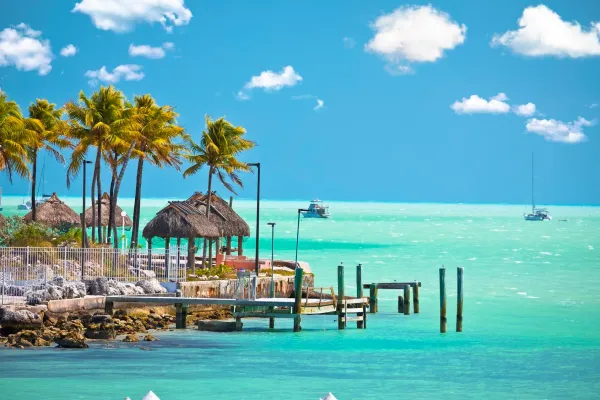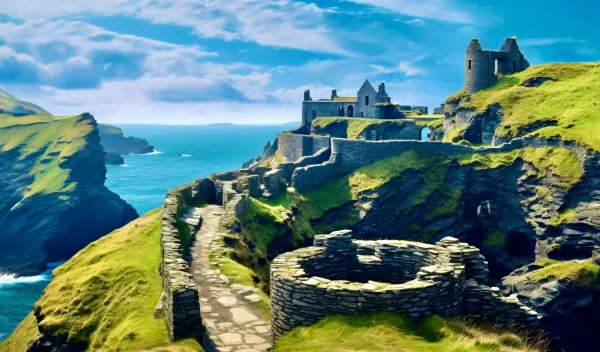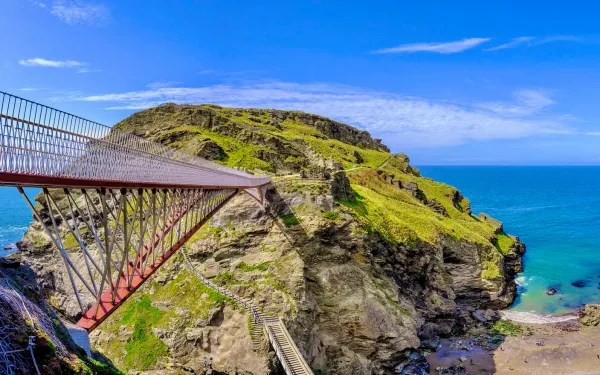Shaming the Cruise Industry: Protesters Dressed as Polar Bears Confront Passengers in France
Environmental activists dressed as wildlife protest against Atlas Ocean Voyages cruise ship in Douarnenez, France, spotlighting the cruise industry's environmental effects on the Arctic and Antarctic.

Overview of the Incident in France
Protesters dressed as polar bears and other animals greeted cruise ship passengers in France, condemning their choice of travel.The luxury cruise ship, owned by Atlas Ocean Voyages, arrived in the port of Douarnenez in Brittany. The protesters criticized the cruise industry for its environmental impact, particularly on remote areas like the Arctic and Antarctic.
Cruise ships emit large amounts of CO2 and contribute to air pollution, causing health issues for local populations. In addition to CO2 emissions, cruise ships also emit black carbon, which is a potent climate pollutant. This black carbon contributes to the loss of snow in Antarctica, affecting the delicate ecosystem. Demonstrations against cruise ships have led to canceled or police-escorted disembarkations in Douarnenez. Protesters argue that the cruise industry is unnecessary and that biodiversity is more important.
The incident in France highlights the growing concern over the environmental impact of the cruise industry, particularly in ecologically sensitive areas. The protesters' actions draw attention to the need for more sustainable practices in the cruise industry and the importance of preserving biodiversity.

The Protest in France
Protesters dressed as polar bears and other animals condemn cruise ship passengers' choice of travel. The luxury cruise ship owned by Atlas Ocean Voyages arrives in the port of Douarnenez in Brittany. The protesters argue that the cruise industry's impact on the environment, particularly in the polar regions, is unacceptable.
The demonstration in France is part of a larger movement against the cruise industry's practices. By targeting cruise ship passengers, the protesters aim to raise awareness among travelers and encourage them to consider the environmental consequences of their choices. The protest in Douarnenez highlights the need for a more sustainable approach to travel and tourism.
Environmental Impact of Cruise Ships
Cruise ships emit large amounts of CO2 and contribute to air pollution, affecting the health of local populations. The combustion of fossil fuels to power the ships releases greenhouse gases into the atmosphere, contributing to climate change. In addition to CO2 emissions, cruise ships also emit other pollutants such as sulfur dioxide and nitrogen oxides, which can have harmful effects on air quality.
The cruises to the poles contribute to black carbon pollution and the loss of snow in Antarctica. Black carbon, also known as soot, is a potent climate pollutant that accelerates the melting of snow and ice. Research shows that each Antarctic tourist effectively melts 83 tonnes of snow. This loss of snow has significant implications for the delicate ecosystem of Antarctica and its resident wildlife.
Protesters argue that the cruise industry's impact on biodiversity is a significant concern. The noise, pollution, and disruption caused by cruise ships can have a negative impact on marine life, including whales and dolphins. Additionally, the introduction of invasive species through ballast water discharge can disrupt local ecosystems.
To address these concerns, the cruise industry needs to adopt more sustainable practices. This could include investing in cleaner technologies, such as using cleaner fuels or adopting hybrid or electric propulsion systems. It is also important for cruise companies to minimize their waste generation and adopt recycling and waste management practices to reduce their environmental footprint.
Passengers and Cruise Company Response
Some passengers view the protest as an educational experience and an opportunity for different perspectives. For these individuals, the protest serves as a reminder of the environmental impact of their choices and encourages them to consider more sustainable alternatives.
Atlas Ocean Voyages, the cruise company, claims to take sustainability seriously and has made efforts to reduce fuel consumption and environmental impact. They have implemented measures such as optimizing routes to reduce fuel consumption and emissions. The company also promotes responsible tourism and educates passengers on the importance of protecting the environment.
However, it is important to note that not all cruise companies have taken significant steps to mitigate their environmental impact. Some companies continue to operate older, less fuel-efficient ships and have been slow to adopt sustainable practices. The cruise industry as a whole needs to prioritize sustainability and work towards reducing its environmental footprint.
Impact on Port Cities and Overtourism
Concerns about overtourism have led to restrictions on larger cruise ships in port cities like Venice. The influx of cruise ship tourists can place a strain on local infrastructure and resources, leading to overcrowding and a decline in the quality of life for residents. In response to these concerns, some cities have implemented measures to limit the number and size of cruise ships allowed to dock.
Demonstrations against cruise ships have resulted in canceled or organized disembarkations with police escort in Douarnenez. These protests highlight the potential impact of public opinion on the cruise industry. As awareness grows about the environmental impact of cruise ships, more communities may take a stance against the industry and impose restrictions or demand changes to protect their local environment and quality of life.
The cruise industry needs to address concerns and work towards sustainable practices to minimize its impact on local communities and infrastructure. This could involve collaborating with local governments and communities to develop responsible tourism strategies that benefit both the industry and the destinations it visits. By working together, it may be possible to find a balance that allows for tourism while preserving the unique character and environment of port cities.
Other Protests and Global Impact
Protests against the cruise industry have taken place in various locations, including Norway, England, Scotland, France, Australia, and Alaska. Concerns raised by these protests include CO2 emissions and the sustainability of cruise tourism. The cruise industry's impact extends beyond individual destinations, as the emissions from cruise ships can contribute to global climate change and air pollution.
A report revealed that cruise ships emit more sulphuric emissions into Europe's atmosphere than all the continent's cars combined. This highlights the significant impact that the cruise industry has on air quality and the environment. As the industry continues to grow, it is crucial to address these concerns and promote sustainable practices.
Global efforts are needed to promote sustainable practices in the cruise industry. This could involve international agreements and regulations to limit emissions and pollution from cruise ships. It is also important for consumers to make informed choices and support cruise companies that prioritize sustainability.
Conclusion
The incident in France highlights the controversy surrounding luxury and expedition cruises and their environmental impact. Concerns raised by protesters include the contribution of cruise ships to climate change, air pollution, and biodiversity loss. The protest serves as a reminder of the need for the cruise industry to adopt more sustainable practices and minimize its impact on the environment.
Further dialogue and efforts are necessary to address these concerns and promote sustainable practices in the cruise industry. Collaboration between cruise companies, local communities, and governments is essential to finding solutions that balance the economic benefits of tourism with the need to protect the environment. By working together, it may be possible to create a more sustainable and responsible cruise industry that respects the environment and the communities it visits.






